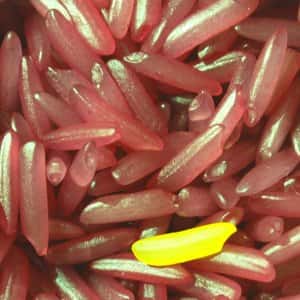
Has your doctor told you that your blood pressure is rising or your cholesterol is too high? Many people prefer to treat such conditions naturally if possible. But just because a treatment is natural does not mean it is completely safe or free of adverse effects. Red yeast rice is a popular natural treatment to lower cholesterol. Readers have wondered about red yeast rice side effects. A recall of products from a Japanese drug company underscore the importance of purity in such supplements.
The Kobayashi Recall of Beni Koji:
The Kobayashi Pharmaceutical company produces over-the-counter medicines and dietary supplements for the Japanese market. In the last few weeks it has had to recall three products containing beni koji, the Japanese version of red yeast rice. The reports are alarming, with more than 100 hospitalizations and five deaths associated with these products.
The company has not yet determined what contamination is responsible. Some of the deaths were due to kidney failure. Because the yeast that makes rice red sometimes produces citrinin, a compound that is toxic to the kidneys, that was suspected. However, the company claims it found no trace of citrinin in the recalled products. It did find puberulic acid, a toxic compound made by blue mold related to Penicillium.
Japanese regulators have inspected two Kobayashi factories to try to find the source of the problem. Kobayashi does not sell its products in the US, but this alarming episode serves as a reminder that even natural products can sometimes do harm.
Red Yeast Rice Triggered IBS Attack:
Q. My cholesterol has crept up gradually for a few years, so my doctor suggested I try red yeast rice capsules. Within a week of starting on them, I had a horrendous IBS attack. I couldn’t trace it to any change in my diet other than the red yeast rice. Has there been any research on this?
A. We are sorry to hear your irritable bowel syndrome flared up while you were taking red yeast rice. One study summarized the adverse reaction reports on red yeast rice submitted to Dutch health authorities (British Journal of Clinical Pharmacology, April 2021). Approximately one-third of the reports involved gastrointestinal disorders, including abdominal pain, nausea, diarrhea and pancreatitis. Needless to say, such symptoms could cause big trouble for anyone prone to digestive distress.
Red Yeast Rice Side Effects:
Q. What is your opinion on red yeast rice for lowering cholesterol? I have tried statins and cannot tolerate them.
A. Red yeast rice naturally contains a low dose of various statin compounds and has been shown to lower cholesterol (Annals of Internal Medicine, June 16, 2009; Nutrition & Metabolism, Sep. 25, 2017). Doctors sometimes recommend this nutraceutical to their patients with moderately elevated cholesterol (Frontiers in Cardiovascular Medicine, May 11, 2015). Although many people tolerate red yeast rice better than a dose of atorvastatin or simvastatin, some do experience red yeast rice side effects.
One reader wrote:
“At the recommendation of my doctor I took red yeast rice to lower my cholesterol. After a month, my arms and shoulders started to hurt. Even after stopping the supplement, the pain has persisted and it feels like knives sticking into my muscles. I can’t lift a mug of coffee without pain.”
Some people are so susceptible to statin side effects that even red yeast rice poses a risk. A recent review of problems reported to the FDA found that there were a number of cases of muscle pain or injury and a few cases of liver disorders (Drug Safety, March 26, 2018).
People with high cholesterol may still benefit from taking red yeast rice and/or plant sterols while they avoid trans fatty acids and highly processed carbohydrates (Maturitas, Feb. 2018). You can read about other natural ways to lower cholesterol and reduce the risk of heart disease in our Guide to Cholesterol Control & Heart Health.
Pay Attention to Your Supplement:
Many commercial red yeast rice formulations vary in strength and quality. According to ConsumerLab.com, some are contaminated with citrinin, a potentially toxic substance. You will want to avoid those if possible.
Tell us about your experience with red yeast rice below in the comment section. Did it lower your cholesterol? Did you have any red yeast rice side effects? How did it compare to statins for you?
Citations
- Vrolijk MF et al, "Red yeast rice (Monascus purpureus) supplements: Case series assessment of spontaneously reported cases to The Netherlands Pharmacovigilance Centre Lareb." British Journal of Clinical Pharmacology, April 2021. doi: 10.1111/bcp.14599
- Cicero AFG et al, "Effect of a short-term dietary supplementation with phytosterols, red yeast rice or both on lipid pattern in moderately hypercholesterolemic subjects: a three-arm, double-blind, randomized clinical trial." Nutrition & Metabolism, Sep. 25, 2017. DOI: 10.1186/s12986-017-0214-2
- Barbagallo CM et al, "Role of nutraceuticals in hypolipidemic therapy." Frontiers in Cardiovascular Medicine, May 11, 2015. DOI: 10.3389/fcvm.2015.00022
- Raschi E et al, "Adverse Events to Food Supplements Containing Red Yeast Rice: Comparative Analysis of FAERS and CAERS Reporting Systems." Drug Safety, March 26, 2018. DOI: 10.1007/s40264-018-0661-3
- Anagnostis P et al, "Dietary management of dyslipidaemias. Is there any evidence for cardiovascular benefit?" Maturitas, Feb. 2018. DOI: 10.1016/j.maturitas.2017.11.011

